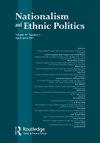缅甸早期转型中的穆斯林证券化(2010-15)
IF 1.1
Q3 ETHNIC STUDIES
引用次数: 0
摘要
2010年至2015年间,随着缅甸从独裁统治向更加自由和民主的国家过渡,其穆斯林人口越来越多地面临仇恨言论和暴力。这篇文章超越了将日益增长的反穆斯林情绪视为自由媒体环境的结果的分析,使人们能够表达长期存在的不满和偏见。相反,“穆斯林对缅甸佛教徒构成威胁”的概念被认为是一个动态的证券化过程的结果,在这个过程中,政治和宗教精英组成的联盟形成了,他们的话语改变了政治领域的规则,迫使以改革为导向的反对派陷入战略沉默。本文认为,在自由化初期,反穆斯林框架被正常化,从而塑造了穆斯林的证券化。本文章由计算机程序翻译,如有差异,请以英文原文为准。
Securitization of Muslims in Myanmar’s Early Transition (2010–15)
Abstract Between 2010 and 2015, as Myanmar transitioned from authoritarian rule to a more liberal and democratic state, its Muslim population increasingly faced hate speech and violence. This article goes beyond analyses that regard the growing anti-Muslim sentiment as a consequence of a liberalized media environment, enabling people to voice long-standing grievances and prejudice. Rather, the notion of a “Muslim threat” to Myanmar’s Buddhist population is approached as the outcome of a dynamic process of securitization in which an alliance of political and religious elites was forged whose discourse changed the rules of the political field, forcing the reform-oriented opposition into strategic silence. It is argued that in the early period of liberalization, anti-Muslim frames were normalized and thus shaped the securitization of Muslims.
求助全文
通过发布文献求助,成功后即可免费获取论文全文。
去求助
来源期刊

Nationalism and Ethnic Politics
ETHNIC STUDIES-
CiteScore
1.30
自引率
0.00%
发文量
30
期刊介绍:
Nationalism & Ethnic Politics explores the varied political aspects of nationalism and ethnicity in order to develop more constructive inter-group relations. The journal publishes case studies and comparative and theoretical analyses. It deals with pluralism, ethno-nationalism, irredentism, separatism, and related phenomena, and examines processes and theories of ethnic identity formation, mobilization, conflict and accommodation in the context of political development and "nation-building". The journal compares and contrasts state and community claims, and deal with such factors as citizenship, race, religion, economic development, immigration, language, and the international environment.
 求助内容:
求助内容: 应助结果提醒方式:
应助结果提醒方式:


